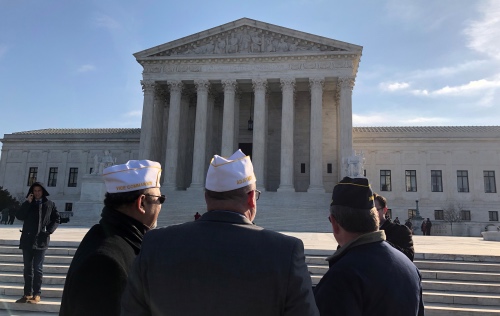US Supreme Court justices on Wednesday signaled a willingness to let a 12 metre tall cross-shaped war memorial stay on public land in Maryland despite a legal challenge that called it an unconstitutional government endorsement of religion.
But during a lively 70 minute oral argument in the major case about the separation of church and state, the justices appeared unlikely to issue a sweeping ruling allowing greater government involvement in religious expression.

Supporters of a cross, commemorating servicemen killed in World War One in Bladensburg, Maryland, gather outside the US Supreme Court ahead of oral arguments over whether the memorial is an unconstitutional government endorsement of religion, in Washington, DC, on 27th February. PICTURE: Lawrence Hurley/Reuters
Justice Stephen Breyer, one of the court’s four liberals, suggested a compromise ruling allowing the cross to remain based in part on the fact it was built in 1925 while making it clear that newly built religious symbols would be treated differently.
“What about saying past is past…but no more?” Breyer asked.
On one hand “we’re not going to have people trying to tear down historical monuments,” Breyer said. But on the other, “we are a different country now” that is more pluralistic, he added.
The case, one of the most important of the court’s current term, presented the justices with their latest test on the parameters for government-endorsed religious expression. A ruling is due by the end of June.
The so-called Peace Cross, a concrete memorial to 49 men from Maryland’s Prince George’s County killed in World War One shaped like a Christian cross, is situated on public land at a busy road intersection in Bladensburg just outside Washington.
Fred Edwords and two other plaintiffs filed a 2014 lawsuit challenging the cross as a violation of the US Constitution’s Establishment Clause, which prohibits the government from establishing an official religion and bars governmental actions favoring one religion over another.
On the bench, where conservatives hold a 5-4 majority, liberal Justices Ruth Bader Ginsburg and Sonia Sotomayor appeared the most reluctant to find the cross constitutional.
On the question of whether the cross should be retained because of its historic nature, Sotomayor pointed out that there are few large crosses on public land across the nation.
“We don’t have a long tradition of that. It’s sectarian,” Sotomayor said.
Fellow liberal Justice Elena Kagan asked tough questions of the monument’s supporters, at one point noting that the cross is “the foremost symbol of Christianity.” But at another point, Kagan appeared willing to compromise, based on the role of the cross as a war memorial. Aside from its shape, the cross has no other religious themes or imagery.
“So why in a case like that can we not say essentially the religious content has been stripped of this monument?” Kagan asked.
There appeared little appetite on the court for a broad ruling proposed by the American Legion, a veterans’ group that supports the cross, that would say that the government violates the Constitution only when it actively coerces people into practicing religion.
Several conservative justices indicated they are not content with the court’s current precedent that holds that mere government endorsement of religion is unconstitutional, but the alternative test suggested by the American Legion did not seem to appeal either. One of them, Justice Neil Gorsuch, described both approaches as a “dog’s breakfast.”
Edwords, who is retired, is a long-time member and previous employee of the American Humanist Association, which advocates for the separation of church and state.
The most steadfast supporter of the Maryland cross was conservative Justice Samuel Alito, who questioned the American Humanist Association’s lawyer, Monica Miller, on the fate of other crosses on public land if she were to win.
“Do you want them all taken down?” Alito asked.
The cross was funded privately and the property where it stands was in private hands when it was erected, but it is now on land owned by the Maryland-National Capital Park and Planning Commission, a governmental agency.
The cross has the backing of President Donald Trump’s administration. The American Legion holds memorial events at the site. Veterans and their relatives have said the monument has no religious meaning despite being in the shape of a cross, calling the lawsuit misguided and hurtful.
The Richmond-based 4th US Circuit Court of Appeals found the cross unconstitutional, reversing a Maryland-based federal judge’s decision. That ruling was appealed by the park commission and the American Legion, which is represented by the conservative religious rights group First Liberty Institute.
The Supreme Court has sent mixed messages about limits on government-approved religious expression, including in two rulings issued on the same day in 2005.
In one, it ruled that a monument on the grounds of the Texas state capitol building depicting the biblical Ten Commandments did not violate the Constitution. But in the other, it decided that Ten Commandments displays in Kentucky courthouses and schools were unlawful. Breyer was the decisive vote in both cases.
Additional reporting by Andrew Chung





